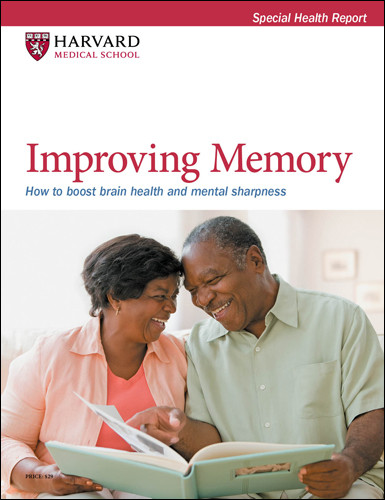Bring a fuzzy memory back into focus
Treating underlying conditions, living a healthy lifestyle, and doing crossword puzzles may help.
- Reviewed by Anthony L. Komaroff, MD, Editor in Chief, Harvard Health Letter; Editorial Advisory Board Member, Harvard Health Publishing

If you're like most people ages 50 or older, your power of recall has lost a little wattage. That becomes clear if you often forget where you left your glasses or can't remember why you walked into a room. Those everyday lapses in memory are normal in middle and older age. Why is that, and can you do anything to change it?
Age-related brain changes
Subtle changes occur everywhere in the body as we get older, including in the brain. Some of those changes affect memory.
For example, a brain region called the hippocampus (which plays a big role in learning and memory) shrinks a little, and structural and chemical changes in brain cells make it harder for them to communicate. That makes it challenging for us to concentrate or absorb and recall new information.
Underlying conditions
On top of aging, some people have health conditions that make it harder to concentrate or remember information. Examples include depression, thyroid disease, vitamin deficiency, migraine headaches, or medication side effects.
Sleep deprivation can also affect your memory. "To learn new information, you need to be alert so you can pay attention. But it's hard to be alert if you're tired," says Dr. Andrew Budson, a neurologist and chief of Cognitive and Behavioral Neurology at VA Boston Healthcare System. "And to store a memory over time, you need to consolidate it during sleep, when brain cell connections become strengthened. If your sleep is interrupted or of poor quality, the strengthening process may be disrupted," Dr. Budson says.
Some memory problems can be early signs of dementia. While forgetting where you put your glasses isn't a concerning symptom, forgetting what glasses are for — or forgetting the names of family members — is something to take more seriously.
If you suspect that you have a health condition that is contributing to a fuzzy memory, see your doctor to figure out what the problem is and get it under control.
Sharpening memory
Keeping the brain as healthy as possible might help slow age-related brain changes. The best way to do that is by living a healthy lifestyle: exercising regularly (at least 150 minutes per week of moderate-intensity exercise, like brisk walking), giving yourself the opportunity to sleep seven to nine hours per night, eating a Mediterranean-style diet, managing stress, socializing, and learning new things. These habits work together to help create new connections between brain cells, and to maintain existing ones, which keeps thinking and memory sharp.
In addition, you can help keep your memory in good shape by practicing certain habits.
For learning new information: "Pay attention and put effort into the learning process," Dr. Budson says. "Many people believe that they can learn information and retrieve memories while they multitask, but the evidence shows that they cannot. If someone is talking to you while you're checking your email or watching TV out of the corner of your eye, you're not likely to remember what they said. Write down the information, say it out loud, or repeat it back to the person."
For memory retrieval: "It's important to relax and try to go back in your mind to the time and place when you formed the memory. Think about the senses that were engaged at the time. What did you see, hear, smell, taste, or touch? What were you feeling at the time? The brain ties those perceptions to memories as a way to help you retrieve them later," Dr. Budson explains.
For overall sharpness: Make your brain work harder. Challenge it with exercises such as crossword puzzles. A small randomized trial of people with mild cognitive impairment, published online Oct. 27, 2022, by NEJM Evidence, found that people who did online crossword puzzles for 18 months had less brain shrinkage and performed better on memory tests than people who took part in online cognitive games that included memory, matching, spatial recognition, or processing speed tasks for 18 months.
Dr. Budson isn't surprised. "Many studies have shown that doing moderately difficult cognitive tasks is better for your brain than doing easy tasks," he says. "A good crossword puzzle in particular causes you to use large areas of your brain to come up with the correct word, and that will, in turn, keep those areas of your brain strong. Finally, crossword puzzles — at least in my household — are usually a social activity, in that the person with the puzzle will frequently call on others nearby for help. And the more we connect with others, the more we'll keep our brain cells connected, firing, and ready to work."
Image: © Jose Luis Pelaez Inc/Getty Images
About the Author

Heidi Godman, Executive Editor, Harvard Health Letter
About the Reviewer

Anthony L. Komaroff, MD, Editor in Chief, Harvard Health Letter; Editorial Advisory Board Member, Harvard Health Publishing
Disclaimer:
As a service to our readers, Harvard Health Publishing provides access to our library of archived content. Please note the date of last review or update on all articles.
No content on this site, regardless of date, should ever be used as a substitute for direct medical advice from your doctor or other qualified clinician.
















